On May the 10th, a forum entitled 'Chinese Voices on Human Rights in China' was jointly held by the Danish branch of the International Pen Pal Association and the Danish Falun Gong Association in the Danish parliament building. The speakers were part of the North European Human Rights Speech Tour, including the Executive Director of the Association for Asian Research Erping Zhang, renowned Canadian attorney Mr. Clive Ansley, the Executive Director of the Laogai Research Foundation Mr. Harry Wu, Jane Dai and her four-year-old daughter, who lost their beloved family members in the brutal persecution against Falun Gong practitioners in China, and Mr. Jun Feng, a writer and member of Pen Pal International who is an exile in Denmark.
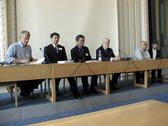 |
Following forums in Oslo, Norway, and Lund, Sweden, the forum in Denmark’s Copenhagen was the third stop on the Chinese Human Rights Speech Tour in Northern Europe. Among the participants were Danish Parliament member Soeren Soendergaard, statesman Viggo Fischer, the chief editor of Politiken’s Asian department, senior reporter and expert on Chinese issues, Flemming Ytzen, and the representatives or reporters from various human rights organisations and media including Christian News, Amnesty International Copenhagen, the World Organisation Against Torture, the Danish Institute for Human Rights, the Danish Political Science Association, etc. All enthusiastically participated in the four-hour speech forum.
With the above-mentioned speakers’ long-term hard work and contribution to China’s human rights issues, their names were not unfamiliar to people concerned with China’s human rights. Their trip to Copenhagen this time attracted the tremendous attention of the Danish people as well as various leading media. Long before the forum was held, reports had been published by major Danish TV stations and newspapers.
 | 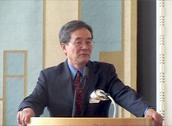 | 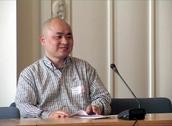 |
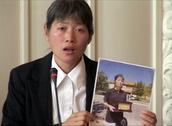 | 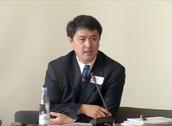 |
The first speaker was Falun Gong practitioner Dai Zhizhen. To appeal to the people around the world to end the persecution taking place in China, she has travelled to nearly forty countries during the past three or so years with her four year-old daughter, Fadu. In this disaster resulting from the persecution against Falun Gong, she has undergone the pain of losing her husband and father-in-law. Her sister-in-law is also imprisoned in a forced labour camp. Her terrible loss touched the audience’s hearts and many shed tears. She once again appealed to the public: To prevent tens of millions of people from suffering the pain of broken families and to prevent more children like Fadu from becoming orphans, let’s step forward to stop this persecution together.
Next, Mr. Erping Zhang talked about information blockages in China. Based on his personal experience, he analysed the approaches taken by the Chinese government to limit freedom of speech. Then, he recounted the entire history of Falun Gong, from the Chinese Government’s encouragement at the beginning to the fabrication of lies to deceive people through propaganda before the launch of a nationwide persecution. He explained how the Chinese government spent a huge sum of money to create an Internet monitoring system and extend its control to every Chinese person's spiritual and private life, so as to deceive and block its people with fear. He stated that to improve China's human rights, freedom of information must be the first step.
In his wonderful speech entitled, “In China a Court is not a Court,” Mr. Clive Ansley said, “Currently many people in western society think that in the past people might be imprisoned without any legal proceedings in China. But after China established its legal system in 1979, with legal protection, China’s human rights situation has improved. So, China is moving forward in the right direction. In the statement given by the Canadian Premier during his visit to China, he even said that under the Jiang regime’s rule, China’s human rights have improved a lot. In fact, China's human rights have not improved; on the contrary they are regressing. For instance, the persecution against Falun Gong, Tibet, and the adherents of other religions is still very cruel. Some westerners, even government officials, are keen on cultivating the people in China’s legal circles, and think that to let them learn western legal knowledge will contribute to the improvement of China’s legal justice. That is an extremely wrong understanding. If China's social system is not changed radically, it is still impossible for the judges, prosecutors and attorneys who receive western education to be independent within the totalitarian regime that employed them. In other words, it is impossible to have judicial independence and impartiality in China."
He added, “In reality, western society has this kind of viewpoint because of their economic interests in China. However, what those western investors must bear in mind is that since there is no real human rights and independent legal system in China, their economic interests in China are at a tremendous risk. Therefore, I would like to advise those investors that in order to protect their personal interests, they need to be concerned about China’s human rights issues.”
Next, Harry Wu introduced China's Re-education-through-labour system, based on his eighteen year personal experience in slave labour camps. He critically castigated the world’s burgeoning concept of pursuing economic interests regardless of human rights. He said, “What confuses people is that during the cold war period, people didn’t want to associate with the evil regimes due to human rights and moral concerns, but today the western society does not dare to defy China for the sake of economic interests. American President Clinton once said, "Our policy is to ensure a stable, prosperous and peaceful China." Such a view is unacceptable. What is “stable”? Why didn’t he say “stable” to Cuba, as opposed to China? This is to help a totalitarian regime maintain its atrocities to people."
He continued, "The true reason behind this kind of viewpoint is money and benefits. But, genocide does not merely take place in Rwanda, Africa, and former Yugoslavia. Similarly it is occurring in China too. At present, the freedom to use the Internet is denied; the Internet cafés are closed; cyber-writers are arrested and illegally imprisoned; even peaceful Falun Gong practitioners, who simply want to pursue a self-perfection spiritual belief are deprived of their basic rights and freedom, and being cruelly persecuted; Tibetans’ belief and human rights are trampled on; labourers’ freedom of association is prohibited. Since 1999, the facts reported by Amnesty International show that on average forty people are killed per week in China! Jiang Zemin told the U.S. government during his state visit to the U.S., "If you don’t raise the 'June 4th incident', I’d like to offer some benefits to you." Thereby, a deal of trading power for money was going on like this. For example, when the western society wanted to change China’s existing judicial situation through providing training programmes to those in China’s legal circles, one of the most fundamental issues is what kind of people might be trained by us? They are simply their government's tools. If they are not willing to recognise the unfairness within China's judicial system, how can we count on them to improve China’s human rights through acquiring legal knowledge? It is like the scenario that you want to transform a carnivorous tiger into an herbivorous animal. What I want to point out here is that we should not do anything based on our wishful thinking!” Mr. Wu added, “I certainly don’t want to comment on your pursuing economic interests, but what’s more important is that at least your acts must live up to your moral standard. Those who are suffering from the persecution are innocent people who are entitled to the same rights as you.
In his speech on “My view on China’s human rights,” a writer in exile in Denmark called Mr. Feng said, "Compared to the blunt statement, 'We are simply concerned about money regardless of human rights' made by the Japanese Government, the position, 'China’s human rights situation is improved", taken recently by the French and German Governments irrespective of objective reality, is much worse." He advocated that we first urge a person not to persecute another person, and that only after people are changed, can a government be changed.
 | 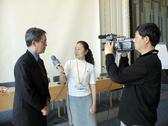 |
Finally, the speech forum proceeded to a heated question/answer and discussion session. The participants discussed how to help improve China’s current human rights situation and whether western society could do something on this matter. Finally, the chairman of the forum and the Danish International Pen Pal Association Anders Jerichow raised a most basic question which has puzzled western society most: Why the Chinese regime is so afraid of Falun Gong? As a person who does not practise Falun Gong, Mr. Harry Wu’s answer deserved to be pondered deeply: “The most fundamental reason is that Falun Gong’s high spiritual standard and belief impact the root of Communism. Ruled by the Chinese Communist Party’s totalitarian system in the past decades, China has lost its Chinese moral standard. At present, the entire society is full of corruption and degeneration. Now in China, if you don’t lie, you cannot survive. I don’t mean that all the Chinese are untrustworthy. What I would like to point out is that in terms of groups, among the Chinese I know are two trustworthy groups. They are Falun Gong practitioners and Tibetan Buddhists. Only those people still hold spiritual and religious purity and earnestness, but they are fundamentally in conflict with violence, lies and dictatorship advocated by the Chinese Communist Party.”
The speech forum concluded after the heated discussion.
* * *
You are welcome to print and circulate all articles published on Clearharmony and their content, but please quote the source.










 more ...
more ...